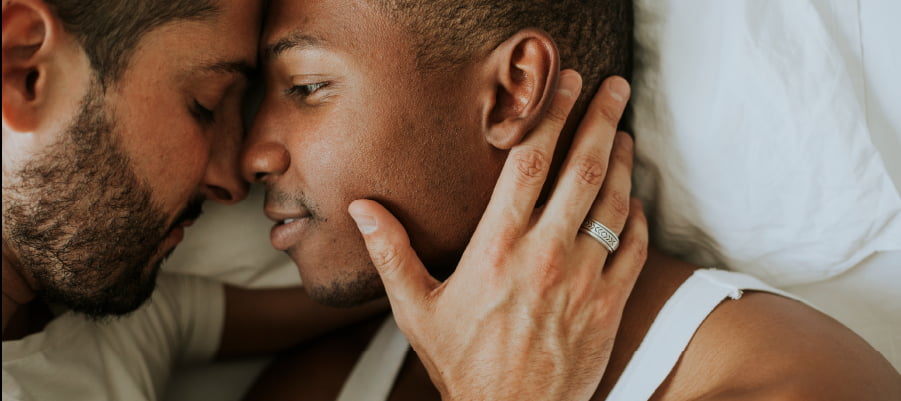In 2013, more than 30% of American men reported experiencing a period of depression in their lifetime,¹ with 9% admitting to daily experiences of anxiety or depression.² Several years and a pandemic later, we can only assume these stats hold steady.
These numbers are concerning, especially when you consider that men are less likely than women to seek help for mental health issues,³ and that the rate of completed suicides is four times higher in men.⁴ Read on to learn more about the signs and symptoms of depression in men and how to get help — for yourself or for someone you love.
What is depression?
People often use the word depression flippantly, saying they're depressed when they feel momentarily low. But depression is much more than feeling sad.
Being clinically depressed — which can also be classified as having a major depressive disorder, major depression or chronic depression — takes its toll on how you act, think and feel. It can manifest in many ways, from experiencing physical symptoms to losing interest in things you once enjoyed.
For someone to be considered depressed, regardless of gender, they must experience symptoms for a minimum of two weeks.⁵
What are the symptoms of depression?
Depression has a wide range of symptoms, including:⁶
- Feelings of sadness
- Changes in appetite or weight
- Sleeping too much or too little
- Loss of energy
- Purposeless movements, like hand-wringing or pacing
- Slower movement or speech
- Feelings of guilt or worthlessness
- Difficulty concentrating
- Difficulty making decisions
- Thoughts of death or suicide
There's no timeline for depression. It can last for weeks or months. Without treatment, it's more likely to persist and intensify, which is why it's crucial to seek help as soon as you recognize these hallmark signs.
How is depression in men different from depression in women?
Depression in men can look a little different. Some of the signs found more often in depressed men include:⁷ ⁸
- Anger, aggression and irritability
- Risky or self-destructive behavior, including substance abuse
- Self-distracting behavior, like workaholism
- Social withdrawal
While depression can be difficult for anyone to acknowledge, it can be especially difficult for men, who seek professional help around half as much as women do.⁹ It's not always objectively clear why this is. However, research reported in the American Journal of Men's Health and elsewhere offers potential explanations:
- Gender socialization and pervasive social stigmas around mental health may lead men to perceive depression as weakness.¹⁰
- Men are less likely to share their feelings with friends and family and may have a harder time recognizing their feelings or behaviors as symptoms of depression.¹¹
- "Externalized" depression symptoms that are more common in men — things like anger, irritability, workaholism or substance abuse — don't fit traditional descriptions of depression, and men who do seek help may not be properly diagnosed.¹²
What causes depression in men?
It can be challenging to pinpoint the exact cause of depression in anyone. Major life events, including the death of a loved one, the birth of a new baby, the breakdown of a marriage, an upsetting diagnosis, job loss and more, can spur depressive episodes, but sometimes depression comes out of the blue.¹³
Other potential factors include:¹⁴
- Family history of mental illness/genetic variations
- Experiencing violence, poverty or abuse
- Chronic stress
It's helpful to distinguish between depression and grief. People who are grieving generally retain their self-esteem, while people who are depressed may experience thoughts of self-loathing and worthlessness. Understanding the difference is key to treatment.¹⁵
What else can trigger depression?
In addition to the triggers outlined above, there are physical and environmental factors that can come into play:
Vitamin D and depression:¹⁶ Seasonal depression (sometimes called seasonal affective disorder, or SAD) usually coincides with the winter months. It's thought to be linked to lower vitamin D levels, and it can interfere with work, school and family life. While antidepressants can help, light therapy and synthetic vitamin D can also make a big difference, especially in older adults.
Heart disease and depression:¹⁷According to recent research, adults with symptoms of depression are at greater risk of developing coronary artery disease. Plus, patients with coronary artery disease who are also depressed are likelier to have a cardiovascular event, like a heart attack. So if you're depressed and seeking cardiac advice — or under cardiac treatment and seeking help for depression — be sure to tell your healthcare professional.
Testosterone and depression:¹⁸ Hormonal imbalance should also be considered when diagnosing a man with depression. Too much or too little testosterone can lead to issues with mood, difficulty sleeping, and chronic fatigue, which are also common symptoms of depression. A meta-analysis in JAMA Psychiatry from 2019 found that treatment with testosterone significantly reduced depressive symptoms in men. Testosterone levels should be a part of regular blood work for men experiencing depression-like symptoms.
How is depression in men treated?
The first step is to seek help. A family physician is a great first line of defense. Your doctor may choose to run some tests on their own if they're concerned about physical symptoms, or they may refer you to a mental health professional right away.
Once depression is diagnosed, treatment can begin. Common treatments for depression include:
- Medication, like selective serotonin reuptake inhibitors (SSRIs) or tricyclic antidepressants (TCAs)
- Cognitive-behavioral therapy (CBT)
- Interpersonal psychotherapy (IPT)
- Group therapy or talk therapy
- Lifestyle changes, including plans for exercise, diet and stress-reduction
Most depression treatments include some combination of medication, therapy and improvements to your social support systems. Individualized treatment will ensure you get the care you need.
Summary
Depression is a serious and common condition that can look different in men. However, there are many treatments available to lessen its impact. If you or a loved one is suffering symptoms of depression, seek help. You are not alone.













.svg)




